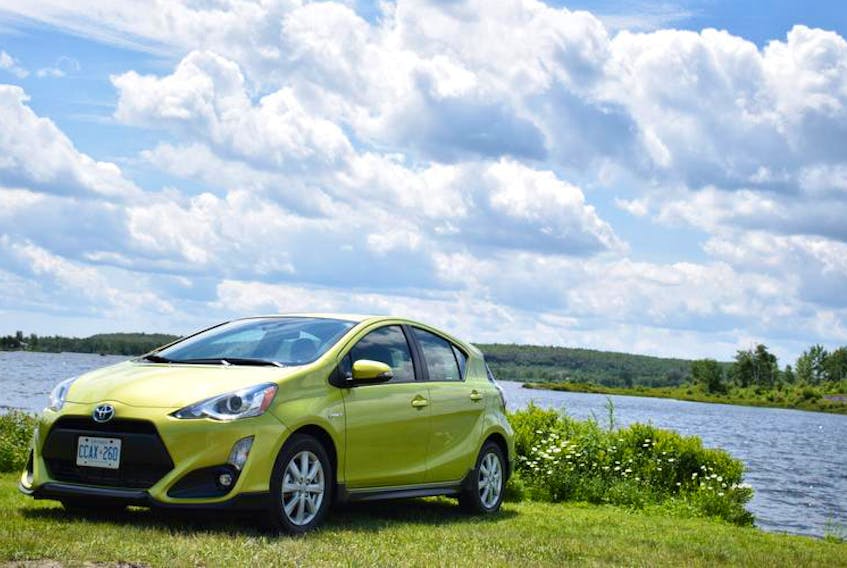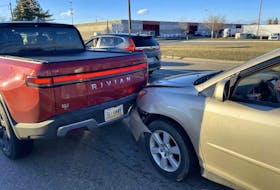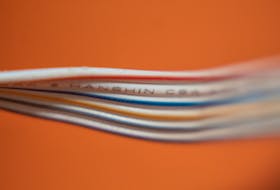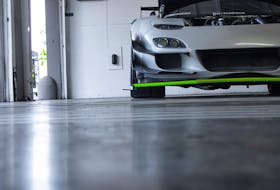Model: 2012+ Toyota Prius c
Vehicle type: Hybrid
History/description: In recent years, the Toyota Prius has moved from a single model into a family of hybrid vehicles designed to cover a wide swath of shopper tastes and preferences. At present, four Prius models are available, and the entry-level model in the lineup is called the Prius c.
This unit hit the market for model-year 2012, and offered drivers a gas-saving Toyota hybrid that was versatile, sneakily manoeuvrable, and intended for use in crowded spaces, particularly in the city. Fuel consumption was rated under 4L/100km. At launch, this gave Prius c the title of Canada’s most fuel-efficient car without a plug.
All units were five-door hatchbacks with room for four average-sized passengers. The look was cheeky and modern, and numerous packages, upgrades and accessories could be added for customization. Look for text-message assist, the Toyota Star Safety System, heated seats, a sunroof, cruise control, navigation, full multimedia connectivity, and plenty more.
All models ran a 1.5-litre gasoline four-cylinder engine with Toyota’s Hybrid Synergy Drive. Power was delivered to the front wheels via a Continually Variable Transmission (CVT), which functions like a regular automatic. Output was rated at 99 horsepower.
What owners like: Prius c owners appreciate good outward sightlines, high maneuverability, and an overall easy-to-live-with character. Many owners say Prius c also has more on-board space than expected and appreciate generous at-hand storage provisions for smaller items. Obviously, fuel mileage is highly rated as well.
What owners dislike: Common gripes include rear seats that tighten up quickly for larger or taller passengers, and limited performance for higher-speed highway merging or passing.
The test drive: Test drivers should spend a few minutes ensuring all on-board accessories are in proper order before they set off for a drive, by operating and using everything that runs on electricity.
Ensure satisfactory operation of all power windows and locks, all touch-screen interfaces, all steering-wheel mounted controls, the headlights, climate and cruise control systems, and more.
Now’s the time to ensure that the Prius c you’re considering for purchase isn’t in need of attention to these areas. Some owners have had hybrid batteries fail at high mileage, though the vast majority have not. If experienced, battery related issues tend to surface at very high mileage. Batteries, including those partially used in hybrid cars, wear out over time.
Most Prius s owners have not reported any battery-related issues, and many variables impact battery life in a hybrid vehicle. The gist? If you’re not buying a very high-mileage unit, you’ve got little to worry about.
Note that the automotive aftermarket has some less-expensive replacement battery pack options, and that some hybrid-savvy owners have snatched up high-mileage Prius c units for a huge discount, replaced the battery on the cheap, and continued driving for years.
Still, beware of warning signs of a weak hybrid battery (warning messages, poor performance, difficulty charging or maintaining a charge), and consider a full inspection by a hybrid-trained technician to be mandatory before your purchase of this, or any used hybrid.
Also note that while the Prius c is a hybrid, it’s also a car with components, lubricants, filters and other serviceable parts that require regular maintenance and care.
Confirm that all fluid changes relating to coolant, engine oil and transmission fluid are current. Also, ensure that tires, brake parts, suspension parts and the alignment are in sound shape, asking a Toyota technician to complete a full assessment before you buy.
Visit a rougher road on your test drive and note that clunking, popping or slamming sounds typically indicate a worn out suspension component that requires attention.
On the topic of noises, any unusual scraping or grinding sounds apparent at lower speeds with the window open, perhaps alongside a warning messages relating to the brakes or traction control system, may indicate the need for new wheel bearings or wheel speed sensors.
In the Prius c, the bearings and sensors are integrated into a single unit, and may cause problems with other vehicle systems, like the traction control or ABS brakes, if they’re worn.
Have a service advisor see if any software updates may apply to the Prius c you’re considering. Updated software is installed by the dealer to correct or improve the operation of certain systems, which can prevent possible headaches. Talk to a Toyota service advisor, having the most up-to-date software can prevent headaches.
Finally, remember that the Prius c has a large hybrid battery, as well as a conventional 12-volt battery, which powers numerous accessories and electronics. A weak or dying 12-volt battery can cause numerous problems, so have the battery tested and replace it if it doesn’t pass with flying colours.
Keeping the Prius c’s 12-volt battery in good shape can go a long way towards reduced problems down the line.
The verdict: Prius c has few issues reported with enough frequency to cause any major concern. For best results, plan to stay on top of the machine’s maintenance, and consider a full Pre-Purchase Inspection (PPI) by a factory-trained Toyota Hybrid technician to be mandatory before your purchase.









